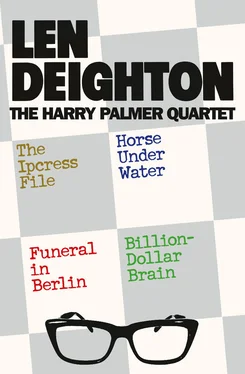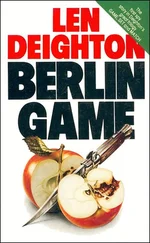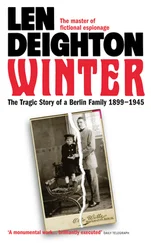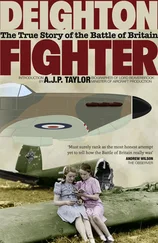‘For perhaps two years the work was pure drudgery; especially since, for a brain as inactive as mine was, the elementary calculations were slow and tedious. But after a little while I got used to the tedium, understanding that these parts of my work were as essential to the arabesques of the final pattern as the rest bars are to a symphony.’
He was telling me not to be bull-headed in a nice sort of way. Carswell must have been the only officer in the entire British army who had deliberately thrown away a commission in a crack cavalry regiment in exchange for a dreary office job that had left him nudging sixty, a substantive captain, with little or no prospect of a move past substantive major, if that.
I think we had both been overdoing it from a work point of view. We decided to go home. Through the window I could see the delicatessen crowded with people in wet raincoats. I phoned down for Murray, and asked him if he would like to come up for a drink. My red emergency phone rang before I’d put the internal one down. The operator with the Scotch accent said, ‘CRO calling you, sir. Class four, priority. Please scramble.’
I pushed the scrambler button and switched in the green switch of the recording apparatus. I heard the operator tell them they were through to me.
A high-pitched falsetto voice that I had spoken with before said, ‘Hello, Criminal Records Office, Scotland Yard. Military Liaison Officer Captain Keightley speaking.’
I said, ‘Yes, Keightley?’ I knew my evening by the coal fire with a history book had gone bang.
1 Name withdrawn from MS.
[ Aquarius (Jan 20–Feb 19) Don’t be surprised if trips to other people’s houses bring whispers of insincerity for you will also discover a new friendship .]
‘We’ve had a call from Shoreditch Police Station, sir. Frightfully funny business really.’ All Keightley’s ‘r’s were pronounced like a ‘w’. ‘They have a fellow there. Traffic accident. His car scraped a traffic signal I believe.’
‘Yes,’ I said. ‘So?’
‘Well sir, the constable asked him for his licence and so on …’
‘Keightley, get to the point please.’
‘Well, sir, this johnny in the car. We’ve no record here at the CRO, not a white card that is, but there is a green card for him. You know it’s for suspected persons without a criminal record.’
‘Yes, I know that. Tell me, how did you locate his card? Did he give his name?’
‘No, sir. That’s just it. You see, this johnny is dressed up in a Metropolitan Police, Chief Inspector’s uniform. Luckily the constable had worked in CRO for a year, recognized him and remembered the face. He thought we had a white card but we only have a green one. It’s endorsed to your department, with one of those star marks for top priority. So I phoned you. What we want to know, sir, is, shall we tell Shoreditch that there is a green card? There may be an Interpol card of course. Do you want him? That’s what I want to know, sir.’
‘Listen, Keightley. Tell Shoreditch I want this man held. In fact I want him stripped. I want them to be most careful. Watch for cyanide pills. This could be very important. Tell the chief there that I’m holding him personally responsible for the prisoner’s safety. I want him under lock and key from the minute you finish talking to them, and he’s to be kept under constant observation. Oh, yes, and make sure the constable that brought him in is available – they should make that copper a sergeant on the spot. Pulling in an inspector, indeed: some nerve; and tell them I’m leaving right away. I’ll be there before 7.30.’
‘Yes, sir, right away, sir.’
‘Oh, and Keightley.’
‘Sir?’
‘You did right to tell me immediately, whatever the outcome.’
‘Thank you, sir.’
I buzzed my controller on the big exchange and they had a black Jaguar at the ready. I locked the IBM and the recorder, I pressed the white button that set the phone to automatic recording. Murray still hadn’t finished his drink and asked me if he could come for the ride. I don’t have fixed rules about that sort of thing so I said OK. Carswell decided to call it a day. We walked across to Tottenham Court Road and within an instant of reaching the corner the car swept us in. The driver was one of the civilians the police let us have just after the war so he needed no guidance to Shoreditch Police Station. We moved across into the New Oxford Street traffic and up Theobalds Road. I let the driver use the bell and he pulled over to the offside of Clerkenwell Road and shot the speedometer up to seventy.
We were half-way across City Road when a yellow newspaper van coming north from Moorgate realized that we weren’t stopping either. The van wheels locked as the driver hit the brake pedal. Our driver pushed the accelerator even harder, which gave the van an inch or so of clearance as it slid across behind us with white hot brakes and the driver’s face to match. The last thing I wanted at this stage was that sort of complication.
‘Careful,’ I said, in what I considered masterful restraint.
‘That’s all right, sir,’ said the driver, mistaking vexation for nervousness. ‘They’ve got rubber mudguards on those paper vans.’
I realized why the police had let us have him.
It had really begun to rain in earnest now and the streets were a kaleidoscope of reflected taillights and neon. As we drew up in front of the Police Station three policemen were standing in the doorway. I’m glad they weren’t fooling about as far as security was concerned. The driver left the car and came into the station with us. He probably thought he’d see someone he knew. Murray and I were greeted by the sergeant that Keightley had spoken to.
‘All absolutely under control, sir,’ he said proudly. ‘No sooner said than done. Your other two people are parking their car. They needn’t have troubled …’
‘Other two people?’ I said. A cold colicky pain kneaded my stomach. I knew that I needn’t have troubled either. When we got to him he was naked, horizontal and very dead. I turned the body over. He was a strong, good-looking man of about thirty-five. He looked older close to than when I’d seen him before. We could cross Housemartin off our files. Just as Jay’s people were crossing him off theirs right now. It was 7.33. His uniform gave clues – a packet of cigarettes, some money – £3 15s 0d, a handkerchief. I sent immediately for the police constable who had pulled him in. I asked him everything that had happened.
PC Viney came in with a half-written report and a small stub of pencil. He was almost bald, a thick-set man, perhaps an ex-army athlete, a little towards the plump side, he even now would make a formidable opponent. His thin hair, white at the temples, framed his very small ears set well back; a large nose was red from the night air; and his lower jaw was carried well forward in the way that guardsmen and policemen cope with chin straps that don’t fit under the jaw. Under his open tunic he wore a badly knitted red pullover with blue braces over the top. His attitude was relaxed and shrewd, as could be expected from someone who had pulled in a man dressed as an inspector.
The sergeant behind me was leaning in the cell door saying, ‘In thirty-five years of service …’ loud enough for me to hear, and worrying himself sick about his pension.
I turned back to the constable. He told me that he had suspected Housemartin’s demeanour right from first sight, but would never have come to close enough quarters to recognize him if he hadn’t hit the traffic light. Did he think that the man had come from any of the nearby houses? He thought he might have been pulling out into traffic.
‘Now don’t worry about law court stuff, constable,’ I told him. ‘I’d sooner you told me something that’s a flimsy guess than hesitate because we can’t prove it. Now just let’s suppose that this man did pull away from the kerb and that he had come from one of the houses in that street. Think carefully of that row of houses. Do you know it well?’
Читать дальше












